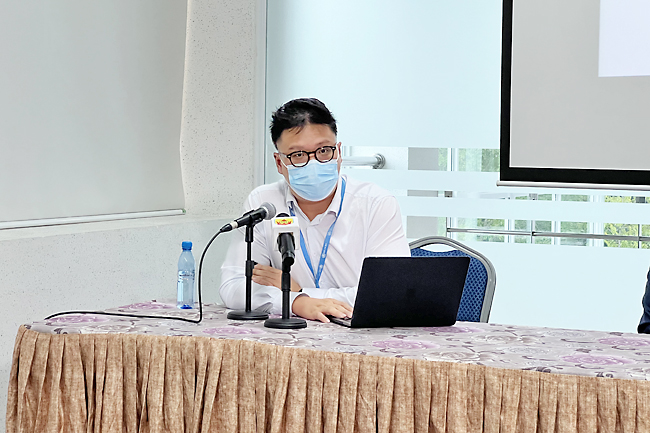Izah Azahari
The antigen rapid test (ART) introduced in 2021 in the Sultanate is now the default COVID-19 testing as it is considered the most suitable for identifying infected individuals.
This is because ART is widely accessible and helps empower individuals and communities to take the responsibility for their health as the country progresses to living with COVID-19.
This was said by Public Health Consultant and Head of Disease Control Division at the Ministry of Health (MoH) Dr Justin Wong during a press conference on the ‘Revision To Testing, Diagnosis and quarantine procedures for COVID-19 Cases and Contacts’ at the Al-‘Afiah Hall of the MoH yesterday, highlighting the use of ART kits, its effectiveness and accuracy in diagnosing COVID-19 cases.
“The concept of social responsibility both at the personal and community level is becoming increasingly important,” said Dr Justin. He added that ART kits used in Brunei are validated by the MoH via the Department of Laboratory Services which checks and cross-checks ARTs and compares the kits to polymerase chain reaction (PCR) testing, and are found to have a high degree of accuracy and reliability.
Dr Justin added that the PCR testing may not be as specific in terms of determining infectivity or infectiousness.

A PCR can remain positive long after a patient is no longer infectious, and the ART is a more specific test for infectiousness.
Moreover, the ART can be done frequently and generates faster results so immediate action can be taken.
Touching on the validation process for all ART kits approved in the Sultanate, Dr Justin said international evidence suggests that the accuracy of ART during periods of community transmission is greater than 90 per cent.
Another local study, looking at data from travellers entering the Sultanate in January 2022 comparing ART positive tests at the airport against PCR tests, showed the accuracy in detecting positive cases at 98 per cent.
“If we use an ART correctly, we can increase its accuracy,” said Dr Justin.
Referring to data from the New England Journal of Medicine by a professor from Harvard on the infectious period of an individual, Dr Justin said over the course of the disease, people are normally infectious in the early part of the disease, while between day seven or eight, they are not as infectious.
“PCR is useful for determining whether a person has been infected, but towards the end of the disease, people are not as infectious. What the ART does is because there is a lower level for detection, we can detect people who are only infectious,” said Dr Justin, adding that individuals who have had the disease for more than 10 days are possibly no longer infectious and no longer detected by ART.
“We have a specific word for the function of this testing, which is ‘specificity’, and the ART has very good specificity which is close to 100 per cent,” Dr Justin added.
“Based on all this information, the MoH had reviewed at the committee-level by looking at international best practices on what is being done in trusted countries and the best practices from health jurisdictions to determine the four best protocols for a person to check if they have been infected with COVID-19.
“We want people to be clear with it because they are now going to be responsible for how they go about doing it as we feel that at this stage, two years on, our people are educated enough to show a high degree of compliance to government directives and that they are able to do it,” said Dr Justin.
Also present during the event were Deputy Permanent Secretary (Professional) at the MoH Dr Ang Swee Hui, and Infectious Diseases Consultant at the MoH Dr Hajah Riamiza Natalie binti Haji Momin.







